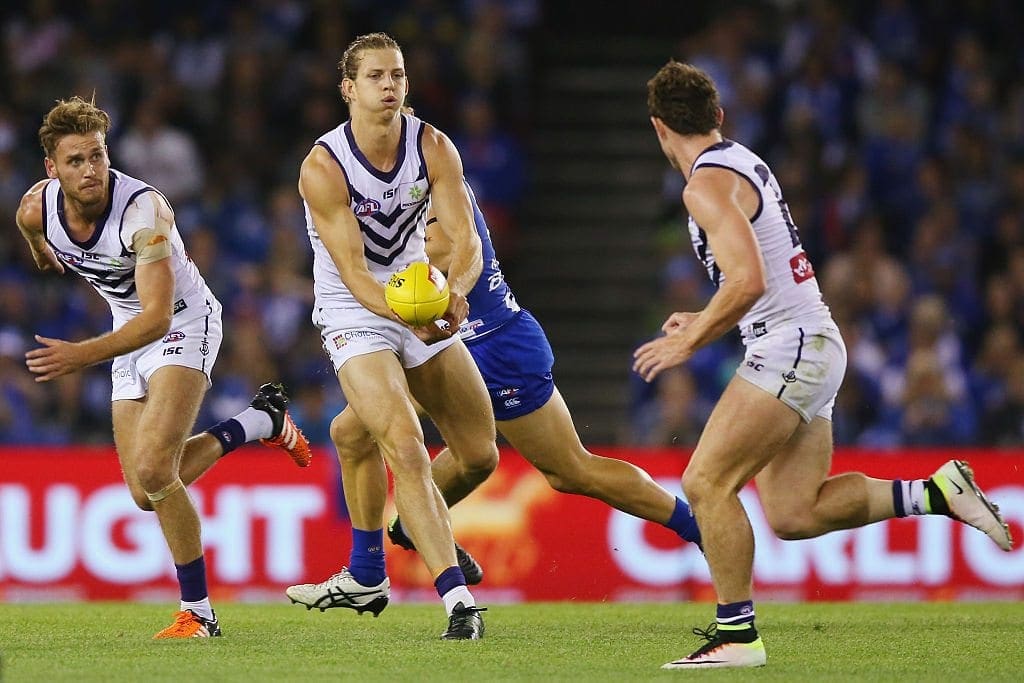Imagine a scenario like this.
The Eagles are 7-4 at the mid-season break. They're sitting in fourth position on the table, but scans have just come through confirming that Nathan Vardy has injured his shoulder and will miss the rest of the season.
Their ruck department consists of a 34-year-old Drew Petrie, Scott Lycett who will make his return to footy in two weeks, and Nic Naitanui and Nathan Vardy, both of whom will miss the entire 2017 season.
Now look at Richmond. They're at the other end of the table, and are just 3-8 at the halfway point of the season.
Ivan Maric is stuck behind Toby Nankervis and Shaun Hampson in the battle for the number one ruck position, and his time at the AFL level is almost up.
West Coast need Maric in this situation, and Richmond really don't.
If the Eagles are happy to send a third round pick to Richmond, why shouldn't both teams get what they want?

Deals like these are why many players and fans are calling for a mid-season trade period, and when both teams benefit like West Coast and Richmond do above, then it's hard to argue against it.
Logistically, plans would need to be put in place for the in-season trade period to become successful, although we believe we might have the solution.
Run it through the bye rounds
As it stands, the AFL has three shortened weeks of football over rounds 11, 12 and 13 as teams have a bye over that three week period.
Fans have complained in the past that those weeks are the most boring during the season due to less games, so to have the trade period run across that three-week window would certainly liven up those rounds.
For the future, if the AFL does indeed go back to one week off during the season, the trade period could run from the Monday of the first week through to the Friday on the next week, meaning there's still footy news for fans around the clock.
Contracts must carry over
If a player has a contract through to the end of the 2018 season and is traded in 2017, then that club must honour his current contract and cannot offer him a new one, whether it be longer or shorter, meaning they commit to the 2018 with him as well as the remainder of 2017.
Despite still remaining as a free agent at the end of the season, this would allow players with expiring contracts to chase premiership glory, and would also stop clubs from reducing incoming players' contracts to just a few months on a short term deal.
Players must be traded without consent
If this rule doesn't come into effect, an in-season trade period simply couldn't work.
It's something that works well in American sports, with franchises trading places for the good of the team, and not the individual.
It's a business, teams are in the AFL to win, not to make players happy.
If Nat Fyfe tells Fremantle he wants to leave via free agency at season's end, then the Dockers should be able to be given a chance to get something back for the Brownlow Medalist.

Fyfe may want to go to a Victorian club, and a team like Melbourne may be willing to give up Christian Salem, a first round pick and a fourth round pick for example for the hope that Fyfe would enjoy the rest of his 2017 season at the Demons, and then sign with Melbourne during the free agency period.
Fremantle walk away from the deal happy because they've got plenty for a player who was going to walk for nothing at the end of the season, and Melbourne walk away happy after having an extra two months to show Fyfe why he should stay at the club, and it eventually helps them get his signature during the free agency period.
It's certainly an interesting topic to talk about, but if the AFL is serious about advancing the game by looking at the big American sports for advice, then this needs to be the next step.

























